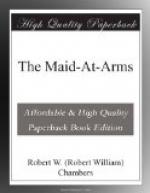A detachment from the Canajoharie regiment surged out of the woods with a ringing cheer, pointing northward, where, across a clearing, a body of troops were rapidly advancing from the direction of the fort.
“The sortie! The sortie!” shouted the soldiers, frantic with joy. Murphy and I ran towards them; Elerson yelled: “Be careful! Look at their uniforms! Don’t go too close to them!”
“They’re coming from the north!” bawled Mount. “They’re our own people, Dave! Come on!”
Captain Jacob Gardinier, with a dozen Caughnawaga men, had already reached the advancing troops, when Murphy seized my arm and halted me, crying out, “Those men are wearing their coats turned inside out! They’re Johnson’s Greens!”
At the same instant I recognized Colonel John Butler as the officer leading them; and he knew me and, without a word, fired his pistol at me. We were so near them now that a Tory caught hold of Murphy and tried to stab him, but the big Irishman kicked him headlong and rushed into the mob, swinging his long hatchet, followed by Gardinier and his Caughnawaga men, whom the treachery had transformed into demons.
In an instant all around me men were swaying, striking, shooting, panting, locked in a deadly embrace. A sweating, red-faced soldier closed with me; chin to chin, breast to breast we wrestled; and I shall never forget the stifling struggle—every detail remains, his sunburned face, wet with sweat and powder-smeared; his irregular teeth showing when I got him by the throat, and the awful change that came over his visage when Jack Mount shoved the muzzle of his rifle against the struggling fellow and shot him through the stomach.
Freed from his death-grip, I stood breathing convulsively, hands clinched, one foot on my fallen rifle. An Indian ran past me, chased by Elerson and Murphy, but the savage dodged into the underbrush, shrieking, “Oonah! Oonah! Oonah!” and Elerson came back, waving his deer-hide cap.
Everywhere Tories, Royal Greens, and Indians were running into the woods; the wailing cry, “Oonah! Oonah!” rose on all sides now. Gardinier’s Caughnawaga men were shooting rapidly; the Palatines, master of their reeking brush-field, poured a heavy fire into the detachment of retreating Greens, who finally broke and ran, dropping sack and rifle in their flight, and leaving thirty of their dead under the feet of the Palatines.
The soldiers of the Canajoharie regiment came up, swarming over a wooded knoll on the right, only to halt and stand, silently leaning on their rifles.
For the battle of Oriskany was over.
There was no cheering from the men of Tryon County. Their victory had been too dearly bought; their losses too terrible; their triumph sterile, for they could not now advance the crippled fragments of their regiments and raise the siege in the face of St. Leger’s regulars and Walter Butler’s Rangers.




